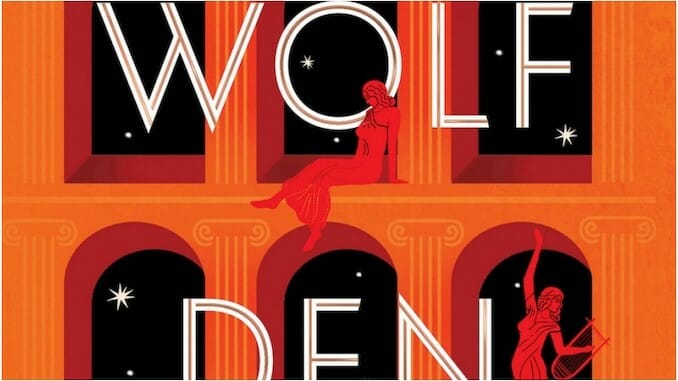
On paper, the idea that a historical novel about the lives of a group of prostitutes in a Pompeii brothel is actually one of the year’s most strident tales of female empowerment seems as though it should be fairly ridiculous. But clearly, none of us saw Elodie Harper coming. Clocking in at nearly 500 pages, her novel The Wolf Den is an enthralling, exhilarating read from its first page to its last, rooted in both archeological fact and emotional truth. (Thank goodness it’s set to be the first installment in a trilogy, is what I’m saying.)
An incredibly well-written and clearly deeply researched tale, Harper’s debut is both a fascinating tale in its own right and an important reclaiming of the sorts of stories from history we far too rarely get to hear. Yes, The Wolf Den is brutal in its violence and unflinching in its depiction of the many horrors and indignities poor women, slaves, and other marginalized groups of this time must have faced. But it’s also like almost nothing else that exists in this genre at present, carefully drawing contemporary parallels that will feel deeply familiar in a world where modern women still must fight far too hard for autonomy, equality, and the right to feel both safe in and in charge of their own bodies.
Set in Pompeii during the first century AD, just a scant few years before the famous volcanic eruption that will encase the city in lava and ash, this is nevertheless a story that is positively teeming with life. (Perhaps one that feels all the more vibrant and desperate for the fact that we know it will all be gone so very soon.) From the crowded bars and dirty alleyways to the colorful marketplaces and lush private homes, every aspect of this world is fully realized right down to the ground.
The bulk of The Wolf Den takes place in the location that gives the book its name, the lupanar or brothel, and follows the story of a group of prostitutes—colloquially referred to as “she-wolves”—who work there. (The fictional site is based on a real location whose structural remains were preserved in the ruins of Pompeii; the story’s characters are drawn from names written in the graffiti of the brothel’s walls.) Its primary protagonist is a Greek girl named Amara, who was sold into slavery when her father died and her respectable family lost all their money. Forced to work for a brutal pimp named Felix who rapes her at will, she longs for a way to win her freedom. (Or somehow come into enough money to buy it.)
Amara finds some degree of comfort and camaraderie with her fellow she-wolves, a motley assortment of desperate, scheming, traumatized women from a variety of different backgrounds who are irrevocably bonded by the horrors of their shared reality. Some, like Amara, remember a time before they were slaves, but others like the loud, brash Victoria have only ever known life in the brothel’s walls. The kind Cressa drinks too much to dull the pain of having her illegitimate child taken and sold, the delicate Dido fears the harsh necessities of her new life as a slave, and the romantic Beronice is determined to make a relationship with one of Felix’s crude bouncers last. Yet, even as they are constantly forced to compete for clients, money, and sometimes, even bread, these women steadfastly rely on one another. The keeper of each other’s worst fears and all too aware of their biggest weaknesses, they work to shield and protect one another when they can.
One of the best aspects of Harper’s writing is that, while she certainly doesn’t shirk at depicting the darkest corners of this world, her story is not an entirely bleak one. Amara’s life is full of tragedy and pain, yet she and the remarkable women of her pack find moments of genuine happiness and heartfelt camaraderie with one another, from attending observances honoring the city’s patron goddess Venus Pompeiana to thronging to see the gladiators pass by at the Forum on a rare day off. Their quiet kindnesses and simple, small joys shine all the brighter for the muck in which they are forced to exist, and though their bodies are often beaten down their spirits are never broken. Even when one might assume they would have had to be.
Though the book has several significant narrative arcs—the dangerous rivalry between Felix and another brothel owner, Amara’s attempts to make her owner take her business acumen seriously, the surprisingly long tail of her relationship with Pliny the Elder—-The Wolf Den is primarily a story about character and relationship dynamics, exploring the psychological toll that this life takes on the women forced to endure it. The book is also shot through with incredibly necessary and raw anger, a bone-deep fury that runs straight from these women to our own times—how have we still not done better by our sisters, then or now?
Harper’s novel is a rich, fully grounded, and deeply engrossing retelling that gives a voice to precisely the sort of women who have never been allowed to speak for themselves before and whose stories have been left to languish on the sidelines of the history we prefer to remember. The The Wolf Den is a thoroughly modern book telling an ancient and age-old story.
The Wolf Den is available now.
Lacy Baugher Milas is the Books Editor at Paste Magazine, but loves nerding out about all sorts of entertainment and. You can find her on Twitter @LacyMB.